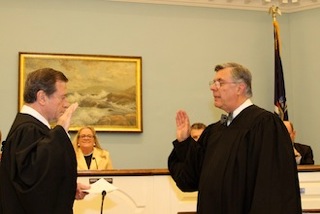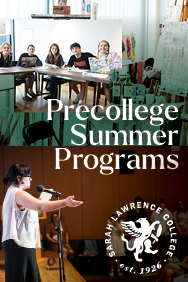From Different Roots, Village Justices George Mayer and George McKinnis Share Common Concerns and Values

Editor's Note: This is the second of two articles about the Bronxville Justice Court.
May 25, 2011: The two judges who share the duties of the Bronxville Justice Court could not have come from more different backgrounds. Chief Justice George McKinnis was born and raised in Oklahoma, began law practice in Kansas, and after touching base with a well-known New York law firm, traveled the world on exotic legal matters. Justice George Mayer was raised in the Bronx, served as a prosecuting attorney in high-profile criminal cases in Manhattan, operated restaurants, and became a founder of Bronxville High School's ski team.
Justice McKinnis presides over two evening sessions of court twice a month; Justice Mayer, over nine morning sessions twice a month. Both of them share a concern for fairness on decisions about such civil matters as landlord-tenant squabbles and criminal violations from simple traffic offenses to assault and drug use.
Justice Mayer has a rich background qualifying him to evaluate criminal cases. For 13 years he was assistant district attorney in Bronx County. At one time he was the lead attorney in a federal trial of 44 defendants charged with drug offenses--the largest trial of its kind before the legendary "Pizza Connection" trial. He worked in the district attorney's racketeering bureau handling cases of official corruption and wiretapping. Later he served in the homicide bureau. For several years he was prosecutor for the Village of Bronxville, handling investigation and prosecution of traffic, code, and parking offenses.
"Crime in the suburbs can be especially disruptive to families," Mayer remarks. "Even one day in jail is a serious matter, and often a dangerous place." Offenders, who have a lot to lose, may be inclined to accept a sentence that does not result in prison. Therefore, he sometimes works as a go-between with district attorneys to craft penalties that are short of incarceration. "Most of the time, the DA will make an offer acceptable to defendants," he notes.
Justice McKinnis, too, is sensitive to the need for alternatives to harsh penalties, especially in teenage cases. Local drunken behavior, he notes, is abetted by some bars in Mount Vernon and Larchmont that freely accept fake identity cards and may even permit parties in bars. In aggravated cases of alcohol abuse by young people, he steers them to a tough alcohol treatment center that is "run like a Marine boot camp." Their parents have to pay for this. Another group is sent to a facility in White Plains. In all such cases, the justice insists that parents appear in his court.
Once, while vacationing with his family in Hilton Head, South Carolina, Justice McKinnis was asked by a local judge for advice on dealing with a group of Bronxville students who were arrested for rowdy behavior. They had been jailed, clothed in striped uniforms, and doused with disinfectant. Justice McKinnis advised sentences of community service. The local judge would not accept church-related midnight runs, but he did agree that the youths could be required to work on Bronxville garbage trucks at 4:00 am daily!
Justice McKinnis obtained his law degree at the University of Michigan. While a young lawyer in Kansas ("I was bored to tears"), Justice McKinnis was offered a job with a New York law firm. The firm needed a lawyer with polite, soft-spoken manners common to the South or Southwest to deal with wealthy elderly clients. He was hired after two hours during which he "sir'd" office boys and "mam'd" secretaries. "I was hired to be a paid schmoozer," he recalls. He was then hired by an Anglo-American merchant bank to work in Nassau, Bahamas. He had to be a bachelor because of political unrest on the island. The job involved travel throughout the world. "I had the time of my life," he recalls. Returning to New York, he did international work for ITT Corporation.
Justice Mayer was educated at the University of Denver and New York Law School. Before his legal career, he worked in a noted family restaurant in the Bronx (Mayer's), and while he was in law school, he opened his own restaurant, Geordie's, on Third Avenue in Manhattan.
Both justices maintain private practices and have been active in community affairs in addition to their court service. Justice McKinnis is president of the Bronxville Beautification Committee and former president of the Bronxville Working Gardeners; he was volunteer village counsel for three mayoral terms and counsel to the Zoning Board of Appeals; and he was former president, and is currently assistant governor, of the Rotary Club of Bronxville.
Justice Mayer has been president of the Bronxville Parents Teachers Association, chairman of the Bronxville Memorial Day Committee, and coach of Eastchester soccer and Bronxville baseball, and he is co-founder of the Bronxville School ski team and family ski trip. The latter has drawn as many as 215 parents and children to slopes in Colorado, Austria, and elsewhere.
One of the justices' most pleasant duties is marrying people. "That empowers me to give 'life sentences,' " Justice McKinnis quips. That task is on the upswing as more couples choose civil instead of religious ceremonies. Justice McKinnis presided over 50 last year.
Pictured here: Justice George McKinnis (L) and Justice George Mayer during a swearing-in ceremony while Mayor Mary Marvin in the background looks on.
Photo by N. Bower
Government & History Directory
Bronxville is a quaint village (one square mile) located just 16 miles north of midtown Manhattan (roughly 30 minutes on the train) and has a population of approximately 6,500. It is known as a premier community with an excellent public school (K-12) and easy access to Manhattan. Bronxville offers many amenities including an attractive business district, a hospital (Lawrence Hospital), public paddle and tennis courts, fine dining at local restaurants, two private country clubs and a community library.
While the earliest settlers of Bronxville date back to the first half of the 18th century, the history of the modern suburb of Bronxville began in 1890 when William Van Duzer Lawrence purchased a farm and commissioned the architect, William A. Bates, to design a planned community of houses for well-known artists and professionals that became a thriving art colony. This community, now called Lawrence Park, is listed on the National register of Historic Places and many of the homes still have artists’ studios. A neighborhood association within Lawrence Park called “The Hilltop Association” keeps this heritage alive with art shows and other events for neighbors.
Bronxville offers many charming neighborhoods as well as a variety of living options for residents including single family homes, town houses, cooperatives and condominiums. One of the chief benefits of living in “the village” is that your children can attend the Bronxville School.
The Bronxville postal zone (10708, known as “Bronxville PO”) includes the village of Bronxville as well as the Chester Heights section of Eastchester, parts of Tuckahoe and the Lawrence Park West, Cedar Knolls, Armour Villa and Longvale sections of Yonkers. Many of these areas have their own distinct character. For instance, the Armour Villa section has many historic homes and even has its own newsletter called “The Villa Voice” which reports on neighborhood news.
Link to Village of Bronxville One Square Mile Monthly Newsletter
Village of Bronxville Administrative Offices
337-6500
Open 9:00am - 4pm excluding holidays and weekends
Bronxville Police Department
337-0500
Open 24 hours
Bronxville Parking Violations
337-2024
Open 9:00am - 4pm excluding holidays and weekends
Bronxville Fire Deparment
793-6400












